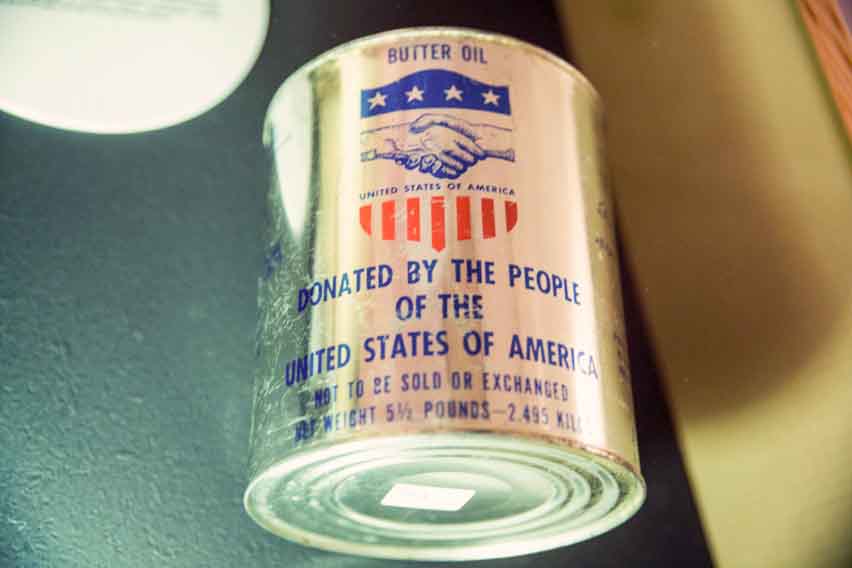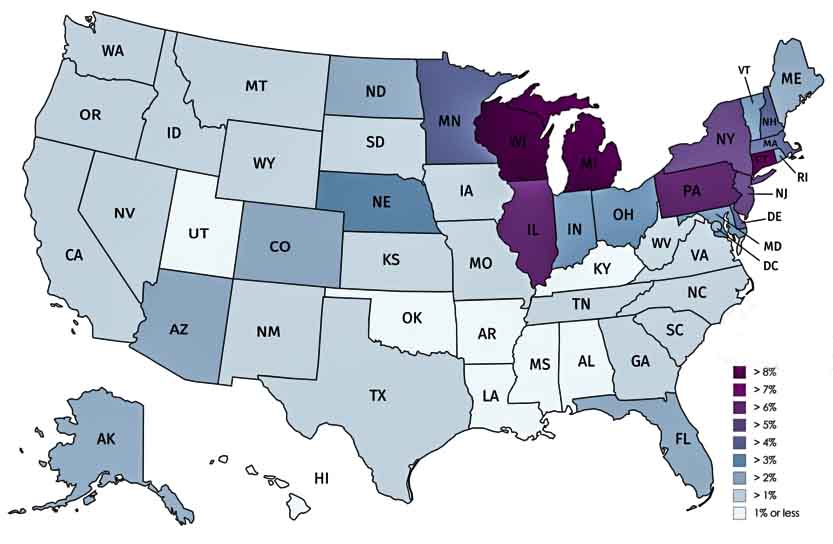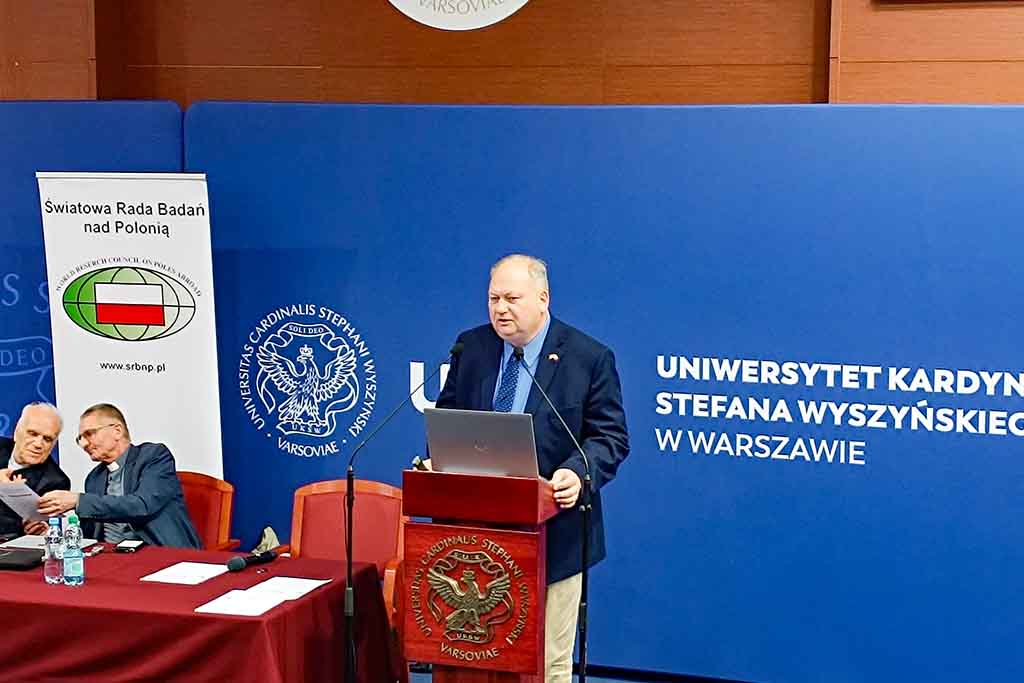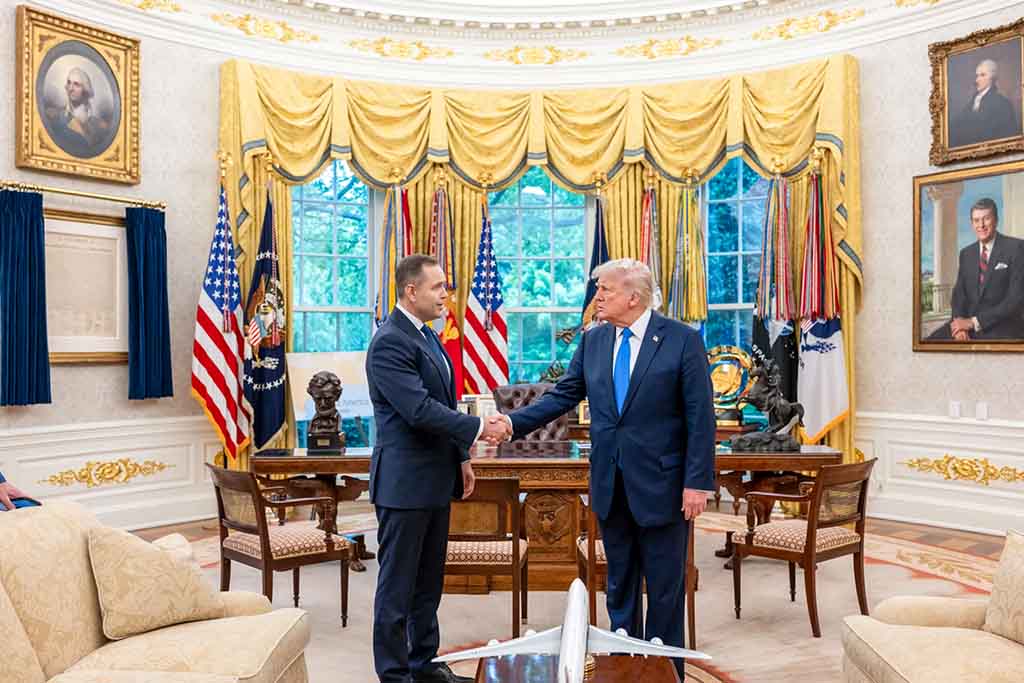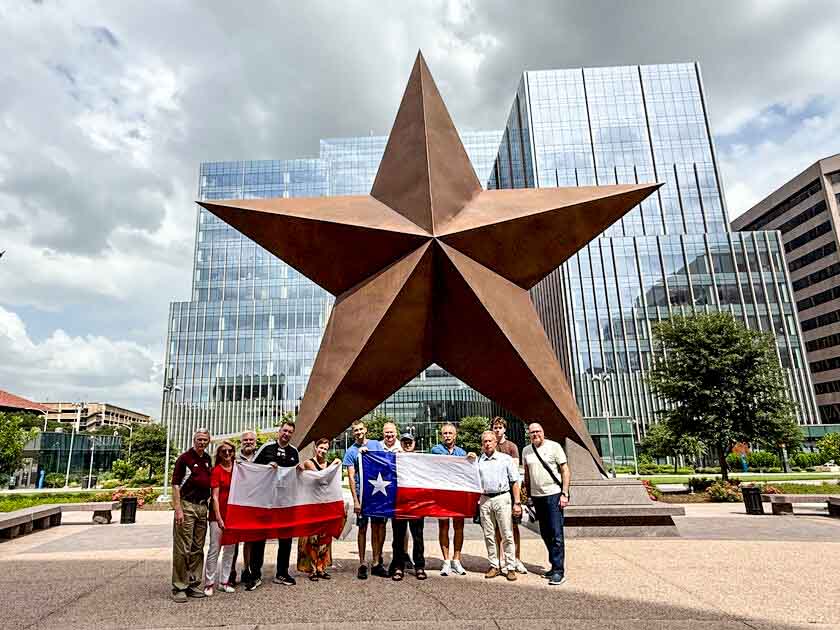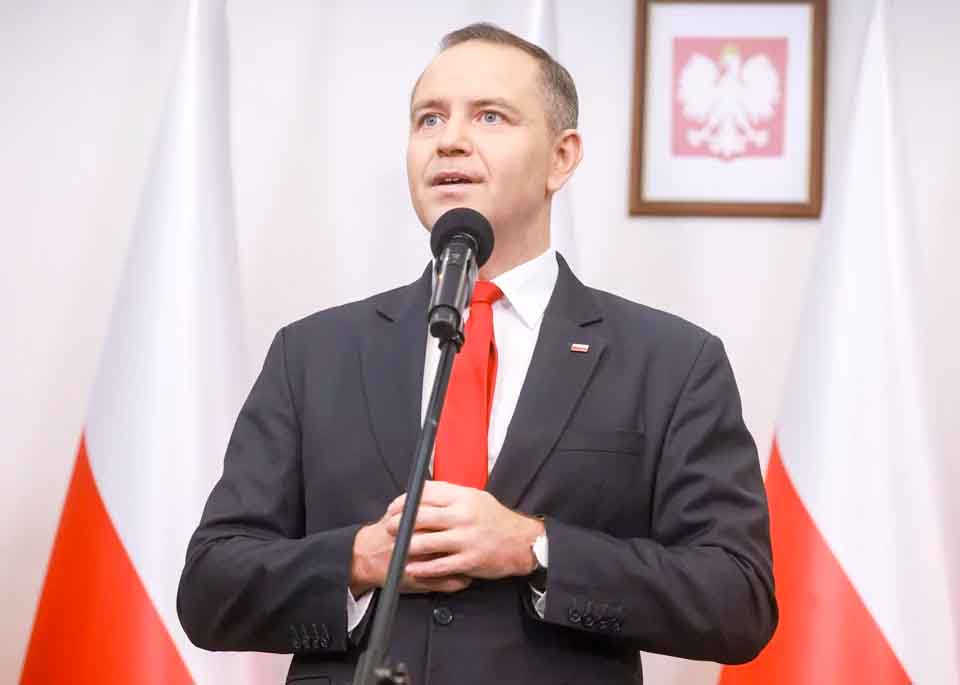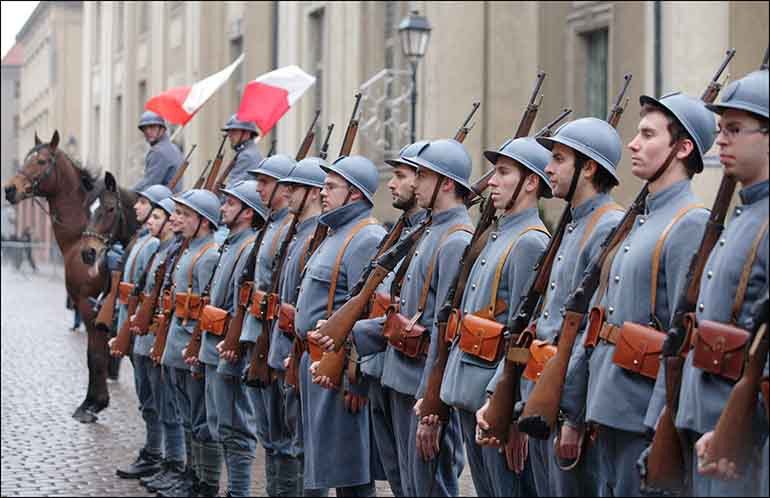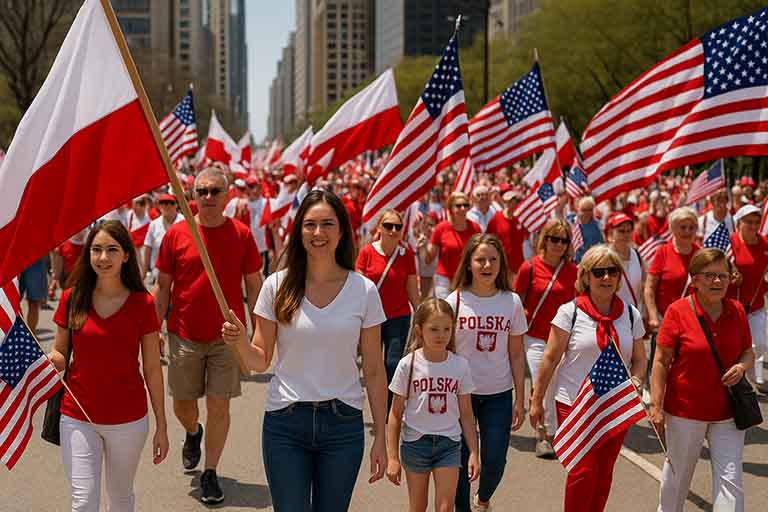The new socio-political arrangement, with President Karol Nawrocki as its architect, will likely be based on a broad coalition of parties, persuasions, and groups. This project presents a unique opportunity: the genuine inclusion of the Polish diaspora in the country's public life.
The Polish diaspora, for decades marginalized in the national debate, possesses enormous potential—both human and financial—especially in the United States. A striking example of its neglect was the recent presidential debate, in which neither candidate mentioned the more than 20 million Poles living outside Poland.
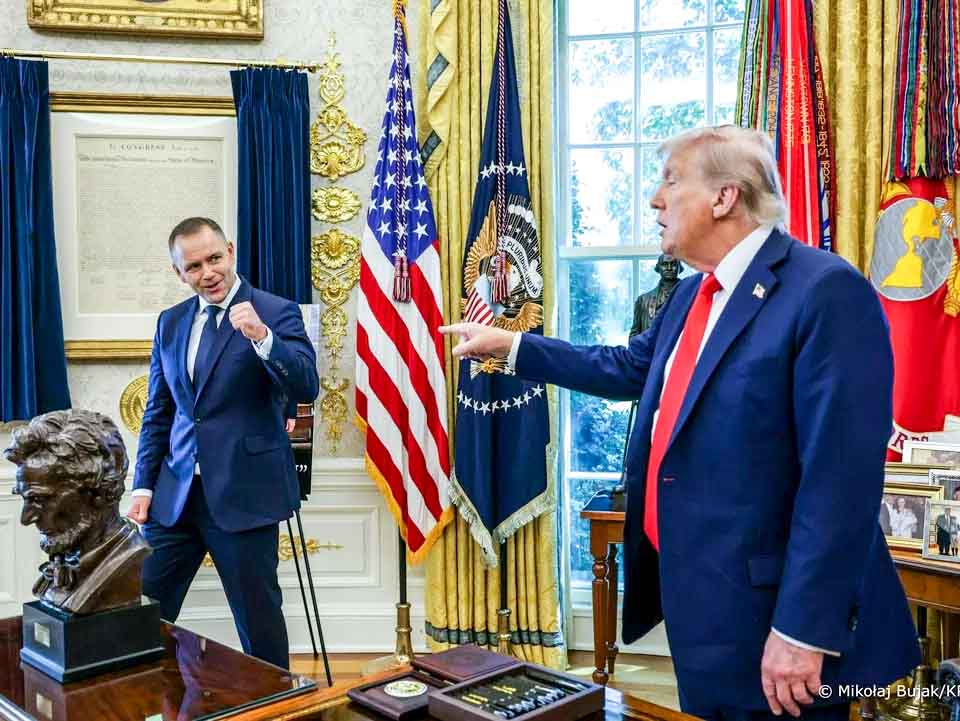
President of the Republic of Poland Karol Nawrocki and US President Donald Trump (Source: Chancellery of the President of the Republic of Poland)
Building a new policy towards the Polish diaspora requires not only political courage but also a deep faith in Poland and in the community of all Poles around the world. The Polish diaspora has made a historic contribution to Poland's independence and prosperity. It's time to honor this legacy through policies that strengthen our shared future. The Polish diaspora is not a relic of the past—it is a powerful partner in shaping Poland's global role in the 21st century.
Magdalenka, the Round Table and Their Consequences
From the beginning of the Third Polish Republic, the Polish diaspora was excluded from participating in public life. A symbolic example was the failure to invite Ryszard Kaczorowski – the last legal president of Poland in exile – to the Round Table Talks. After 1989, emigration, instead of becoming part of the political lifeblood of a resurgent Poland, was consciously omitted.
As a result, the nation was deeply divided. Post-communist elites "made an agreement" with the communists – as Włodzimierz Czarzasty of the Democratic Left Alliance (SLD) himself admitted – while patriotic, independence, and émigré circles were sidelined from rebuilding the state. A telling document from the Military Historical Office, dated February 15, 1990, describes a planned meeting between President Kaczorowski and Prime Minister Tadeusz Mazowiecki in London. The meeting ultimately failed to materialize – officially for protocol reasons – which only confirmed the marginalization of the émigré community.
Kaczorowski proposed a meeting with the Prime Minister and the Polish delegation after the meeting with the Polish community in London, provided the ceremonial "entrance of the President of the Republic of Poland" was observed. Mazowiecki refused, considering it an insult to President Jaruzelski and his own government. During the meeting with the Polish community, he was asked: "Why are there still communists in your government, and Jaruzelski is the president of Poland?" He replied curtly: "Thanks to these people, changes have taken place in Poland, and I am the prime minister."
This was a clear declaration of acceptance of the "Magdalenka model"—a compromise with the communists. The consequence of this choice was the lasting division of the nation and the marginalization of the Polish diaspora, the effects of which are still felt today.
Subjectivity in the Treatment of the Polish diaspora
Today, when a real opportunity arises to restore the Polish diaspora to its rightful place, this opportunity cannot be wasted. It is time to break free from the burden of Magdalenka contracts and open Poland to people free from communist connections, full of energy, competence, and loyalty to their homeland. Unfortunately, the current political elites still treat the Polish diaspora in America solely instrumentally and with envy, failing to recognize the enormous potential it represents for Poland.
If the state pursued a coherent, long-term strategy toward the diaspora and invested in developing its influence, the Polish diaspora in the US could become a pillar of Poland's position in the world. This potential was discussed by, among others, Marcin Palade in his column "Poles Betrayed by Poland," Minister Przemysław Czarnek during a visit to the Polish Heritage Center in Panna Maria, Texas ("It's a shame that Poland hasn't utilized even one percent of the Polish diaspora's potential"), and Professor Jacek Gołębiowski, who emphasized that the Polish diaspora is a bridge to the country's dynamic development.
The visit of a delegation of professors from the Catholic University of Lublin to Texas in July demonstrated that the Polish diaspora is united and a powerful partner in shaping Poland's global role. American Poles are present in almost every important institution related to modern technology.
Meanwhile, the Minister of Foreign Affairs's last two exposés have shown that the topic of the Polish diaspora has been relegated to a less visible debate in the Senate, marginalizing the discussion and underscoring that, in practice, the Polish state continues to treat the diaspora from a command-and-distribute perspective.
Licensed Polonia
I work daily in the American academic community and often discuss diasporas—their organization, strategies, and impact on their home countries. I've been following the example of Ireland, which consciously energized its diaspora in the early 2000s. As a result, numerous international companies relocated their headquarters to Dublin, sparking an economic boom in Ireland.
When confronted with the Polish model of diaspora organization in the US, I encounter surprise and questions like, "What exactly do Polish consulates do?" and "How much Polish taxpayer money is being wasted this way?" Polish diaspora institutions, especially in Europe, create networks of "friendly groups" that generously benefit from subsidies from Warsaw. It's also worth examining how public funds flowed to these organizations, especially before the presidential elections—and who was winning in Europe at the time.
Meanwhile, the Polish American community is de facto suffering the consequences of its political choices—for supporting Donald Trump and Karol Nawrocki. However, the history of this division goes much deeper. Even in the communist era, the Polish community's patriotic activities were disintegrated—first by Soviet intelligence during World War II, and later by the Polish security service. The goal was to destroy and divide the patriotic Polish community, a state of affairs that persists, although the methods have changed.
After 1989, the role of the former services was assumed by some Warsaw institutions, formally democratic but continuing the old patterns. Interestingly, the Institute of National Remembrance (IPN) holds 186 sealed bags of documents relating to the Polish diaspora from 1918 to 1989. When will they be processed? There are also three major institutions in the United States that hold unexamined Polish diaspora documents, but no one has analyzed them yet.
The End of the Frank Spula Era
Ladies and gentlemen, Frank Spula's twenty-year term as president of the Polish American Congress is coming to an end. It will likely go down in history as one of the least effective, resulting in the PAC almost losing its real political clout in the United States.
The new leadership has the opportunity to amend the organization's statute to foster genuine agency and open communication with the entire Polish diaspora, not just a narrow group of select members. For years, we've been seeing the same faces in the media, while the world is becoming increasingly dangerous. Geopolitical threats, such as the situation in the Suwałki Gap, the Russian and Belarusian exercises near Grodno, and the uncertainty surrounding the funding of NATO's eastern flank, require concrete action.
It's a shame that Polonia's most effective leader, Professor Jim Mazurkiewicz from Texas, cannot run because of the two-year requirement to serve on the PAC board. Nevertheless, we will meet the new president in mid-October. Let's hope this is a leader who will restore the luster of this distinguished organization, present both in the White House and the Presidential Palace in Warsaw.
It is important that candidates present a concrete, transparent platform – ideally in a debate in Chicago, prepared by recognized Polish journalists and broadcast by Polish-American media, with the possibility of support from Polish media. Candidates must demonstrate a bipartisan approach, consider the interests of the Polish American Congress and the entire Polish community, and address the needs of both Polish-Americans and Poles with dual citizenship.
The future president's strategy should be far-reaching and based on professional analysis. Equal treatment of all members must be at the heart of the personnel policy. The new leader will also face the challenge of matching the charisma of the first two presidents of the Polish Administrative Court – attorney Karol Rozmarek and attorney Alojzy Mazewski – unrivaled role models of leadership, always welcome in the White House.
The Essence of Polonia's success
Finances and the Potential of Polonia
In the first quarter of 2025, the Polish diaspora remitted approximately PLN 2.86 billion (USD 0.76 billion) to Poland. By comparison, in all of 2023, the total amount of remittances was approximately USD 6.43 billion, almost half the record level in 2008 (USD 12.32 billion).
The Polish & Slavic Federal Credit Union, with 22 branches in the U.S., had $2.45 billion in deposits and 124,708 members at the end of June 2025—an average of over $19,600 per person. It's hard to overestimate the financial potential of approximately 10 million American Poles.
Education and the Intellectual Influence
Americans of Polish descent are wealthier than the average American ($79,000 family income compared to $63,000) and better educated (36% have a college degree compared to 28% of the general population). The majority (71%) declare affiliation with the Roman Catholic Church (Piast Institute, 2013).
The United States is home to over 800 "tenure"-level scientists—those with American habilitations—working at hundreds of universities in Poland and abroad. This group possesses enormous intellectual potential and should become a driving force for Poland's development. Polish universities, research and development centers, and state institutions should actively seek collaboration with this elite, much as the Second Polish Republic did.
"The Polonia is One"
That's what Professor Jim Mazurkiewicz says. However, let's realize that the Polish diaspora is as polarized as American or Polish society. Polish elites in Warsaw increasingly use the term "quarreling Polonia," a narrative created by the "Good Change" elites in Warsaw to camouflage their incompetence in working with their diaspora.
For 30 years, the incompetence of the Warsaw elites, both left and right, has led to their failure to engage in any form of political cooperation with the Polish diaspora, implementing the Round Table Agreements.
Ambassador Anna Maria Anders has masterfully addressed this narrative, explaining the problem in an interview with Anita Gargas. It is also worth recalling here Tadeusz Katelbach's "On Unification and Legalism. The Last Act of Kazimierz Sosnkowski's Public Life," a book originally published in exile about the crisis at the highest levels of the emigration government and General Kazimierz Sosnkowski's efforts to unite the emigration.
The "Blue Army Syndrome"
The "Blue Army Syndrome" is a phenomenon present in Polish politics since 1919. The term itself was first publicly used by Professor Marek Rudnicki after his Senate campaign in 2019. It describes the reluctant, and often downright dismissive, attitude of the Polish authorities towards initiatives undertaken by the Polish American community, exploiting it and leaving it with nothing.
It's worth recalling that over 22,000 American volunteers joined the ranks of General Józef Haller's approximately 70,000-strong "Blue Army." For its time, it was a modern, well-equipped, and highly trained Polish Army formation. It had 120 tanks, 98 aircraft, engineer units, cavalry, artillery, communications units, seven field hospitals, and a cadre of instructors. It also boasted high morale. Haller's men brought back to Poland not only ammunition but also 10,000 horses.
The subsequent fate of the "Blue Army," however, was marked by the political maneuvering of Józef Piłsudski, who sought to limit its significance and influence. In June 1919, General Haller was relieved of his command, which sparked bitterness and a sense of betrayal among the soldiers. The command cadre was gradually replaced with officers drawn from the Legions and loyal to the Marshal. The final blow came with the order of September 1, 1919, to completely disband the army. Its units were incorporated into other military units, and the volunteers from the United States were demobilized.
This decision sparked intense outrage among the Polish American community. From March 1920 to March 1921, approximately 12,000 Hallerczyks returned to New York by ship. The conditions they faced were dire – many were held in transit camps, suffering from hunger and disease, including the onset of typhus. Only then did the ship's doctors provide care. The case received widespread attention in the United States, where Congressmen Julius Kahn of California and Kleczka of Milwaukee, Wisconsin, intervened.
The Fiasco of Światpol
The problem of treating the Polish diaspora with contempt and attempting to "teach it patriotism" dates back to the Sanation era. During the Second World Congress of Poles Abroad, held in Warsaw on August 5, 1934, as many as 40 delegates and some Polish diaspora organizations from the USA refused to join Światpol – an organization intended to unite the Polish diaspora and implement the government's foreign policy. The Congress's goal was to establish a unified structure subordinate to the authorities in Warsaw.
Why did the Polish American community say "no"? The reason was obvious: no American organization could formally affiliate with an institution created by the government established in the wake of the May Coup of 1926. This fact was ignored in Światpol's enthusiastic narrative. This negated the earlier achievements of the Second Polish Republic, when state policy favored emigration and contacts with the Polish diaspora.
After the Sanation government took power, the situation deteriorated significantly. As Professor Wojciech Skóra from the Pomeranian University in Słupsk notes, care for the Polish diaspora and Polish citizens in the US weakened. In 1922, there were six Polish consular offices in the US; by the 1930s, only three remained (Chicago, Pittsburgh, New York) and the embassy in Washington. Meanwhile, in 1935, the United States was Poland's third-largest trading partner after Great Britain and Germany. For a country with 126 million citizens – including nearly 4 million Polish diasporas – such a scale of diplomatic presence was clearly insufficient. For comparison, Poland maintained the same number of consulates in Italy at the time.
Attempts to Build Polonia in Warsaw
I hope we can learn from history. The Polish diaspora in the United States is geographically located in four major time zones, spread across almost every state. The Rust Belt (Ohio, Michigan, Pennsylvania, Indiana, Wisconsin, and even Missouri and Iowa) is home to the largest proportion of the 10 million American Poles who contributed significantly to the Republicans' and Donald Trump's decisive victory. Donald Trump himself spoke extensively about this, emphasizing during meetings with Polish presidents that 85% of the Polish diaspora voted for him. Recently, there's been a narrative that "Trump" won the election thanks to Pennsylvania and certain groups influenced by a certain faction of the Law and Justice party (PiS).
Today, approximately 20 million people of Polish descent live outside of Poland, including 10-12 million in the United States. These are people who emigrated or were born outside of Poland, but declare a strong attachment to their Polish heritage and ties to Polishness. The Polish diaspora is the fifth largest group in OECD countries. Over a quarter of Polish emigrants (28.8%) are people with higher education. They all need a leader, not one appointed from Warsaw, but a charismatic leader recognizable in the White House and the Presidential Palace, elected here and accepted by the entire Polish diaspora. Let's finally learn something. Appointing "our own" is repeating the same mistake. A similar situation applies to consulates. Every four years, the entire staff is replaced as part of the Polish-Polish war, and nothing new is ever built; instead, we simply stagnate.
Conclusions
Believing that Donald Trump and the Republican Party alone guarantee Poland's security is insufficient. The United States is guided solely by its own interests—just recall Act 447 or the lack of financial support for the Three Seas Initiative. A second term as US President may be more beneficial for us, but we cannot base our security solely on the belief in good intentions. We must be guided by Polish interests and the development of local alliances within NATO (from Scandinavia to Turkey), as discussed by Professor Andrew Michta, Jacek Bartosiak, and Marek Budzisz.
Poland must build its own strength—economic and military—and the tools to conduct policy. The first is an effective, professional, and bipartisan diplomacy. The second is a collaborating diaspora that would exert political pressure on congressmen and senators not only in Washington but also in specific states. Our alliance with the United States and our presence in NATO are the foundation of our security, but only a strong army, the Central Transport Hub, infrastructure, a developing arms industry, and opportunities for young people will give these alliances real value.
Strengthening NATO on its eastern flank is a Polish raison d'état, and its guardian in the US – alongside diplomacy – should be the Polish diaspora. Approximately 10-12 million Americans claim Polish roots, a larger number than the Jewish community. The difference lies in the fact that Israel has long provided genuine support to its diaspora, while the Polish diaspora still operates primarily on the empty slogans of Warsaw's elites.
To change this, the Polish diaspora needs tools. A key element would be Polish, English-language television promoting the Polish national interest 24 hours a day. Support for bilingual Polish diaspora media and the creation of a strategic network of collaborations are also essential. The Paderewski Institute could coordinate this process – a necessary think tank that would train leaders, publish analyses in English, and modernize Polish diaspora organizations. As Adam Bąk from New York aptly put it: "we need to awaken the sleeping giant."
Translation from Polish by Andrew Wozniewicz.







